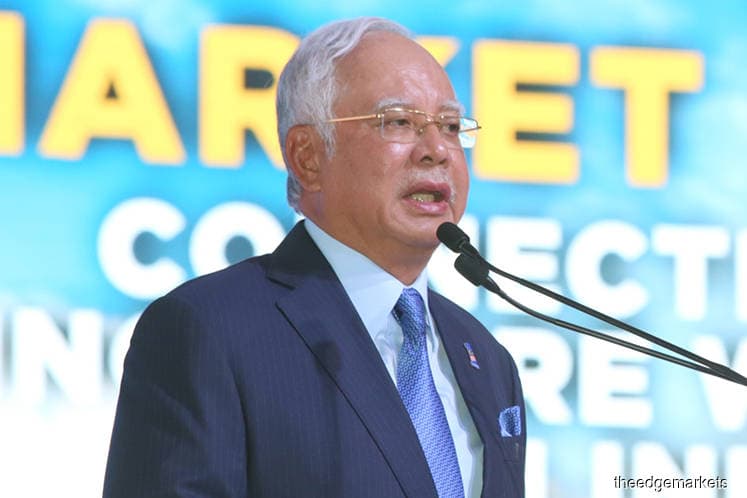
This article first appeared in The Edge Financial Daily on February 7, 2018
KUALA LUMPUR: Retail investors will soon be able to borrow more for margin financing and also allowed to short sell shares on Bursa Malaysia.
These are among the measures aimed at boosting lacklustre retail interest in the local market, announced by Prime Minister Datuk Seri Najib Razak (pic) at the World Capital Market Symposium 2018 here yesterday. Currently, only licensed proprietary traders are allowed to conduct intraday short selling.
Securities Commission Malaysia (SC) chairman Tan Sri Ranjit Ajit Singh believes Bursa has adequate safeguards to facilitate retail traders’ involvement in short selling, regarded as a hedging tool in a bear market. However, Ranjit highlighted that naked short selling — without borrowed scripts — is not allowed.
“We do not allow naked short selling at all. We still require [stock] borrowing arrangements in place. We are very, very clear [about this matter],” said Ranjit, pointing to compulsory requirements to participate in the securities, such as the Stock Borrowing and Lending agreement.
On liberalising margin financing rules, Ranjit said the measures aim to “allow brokers to better leverage on their capital and offer a higher level of margin financing to those who are qualified”. “All the specific details [of the measures] will be rolled out over the next few weeks.”
Other implementations announced by Najib include a volume-based incentive programme, and a six month-waiver of trading and clearing fees for new investors who did not have a Central Depository System account before.
Najib also announced that shares in mid- and small-cap companies will be exempted from stamp duty for three years beginning March 2018. However, there is no change to the brokerage fee for retail investors, Ranjit said.
“The propulsion of the [mid- and small-cap] sector was something announced in the previous Budget [2018],” Ranjit said. “This is a follow-through to incentivise more participation [in mid- and small-cap stocks].”
On whether Bursa will introduce dual-class shares, Ranjit said the SC is watching the developments but that “it is not on our radar at this point”.
The SC, he said, will look into the implementation process in other stock exchanges, such as those in Hong Kong and Singapore, before making a decision. “There are trade-offs from the corporate governance perspective [to consider] as well.”
In a separate statement, Bursa chief executive officer Datuk Seri Tajuddin Atan said the measures announced by Najib echo the exchange’s long-standing efforts to increase the capital market’s depth and breadth.
“Further, these liberalisations as well as incentives granted will enhance our market’s vibrancy and liquidity.
“The exemption of stamp duty on mid- and small-cap companies’ shares traded on Bursa Malaysia is a recognition of this market segment’s importance. This will further boost our current initiatives such as the Mid and Small Cap Research Scheme and the Leading Entrepreneur Accelerator Platform Market,” said Tajuddin.
Measures announced by Najib in conjunction with the launch of Bursa-SGX stock market trading link:
• Three-year waiver of the stamp duty on shares in mid- and small-cap companies on Bursa Malaysia beginning March 2018;
• Margin financing rules will be liberalised to make our market more attractive;
• Intraday short selling will be allowed to all investors;
• A new category of traders who trade on their own account, known as “trading specialists”, will be introduced;
• A volume-based incentive programme will be introduced by the exchange to catalyse greater trading activity; and
• All new investors will be given a fee waiver of trading and clearing fees for six months to encourage more participants to trade on our market.